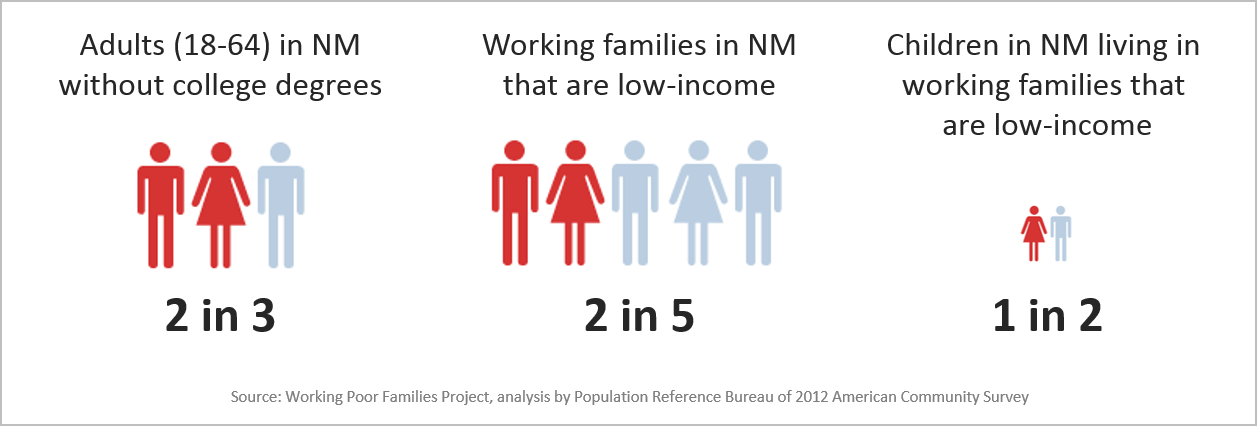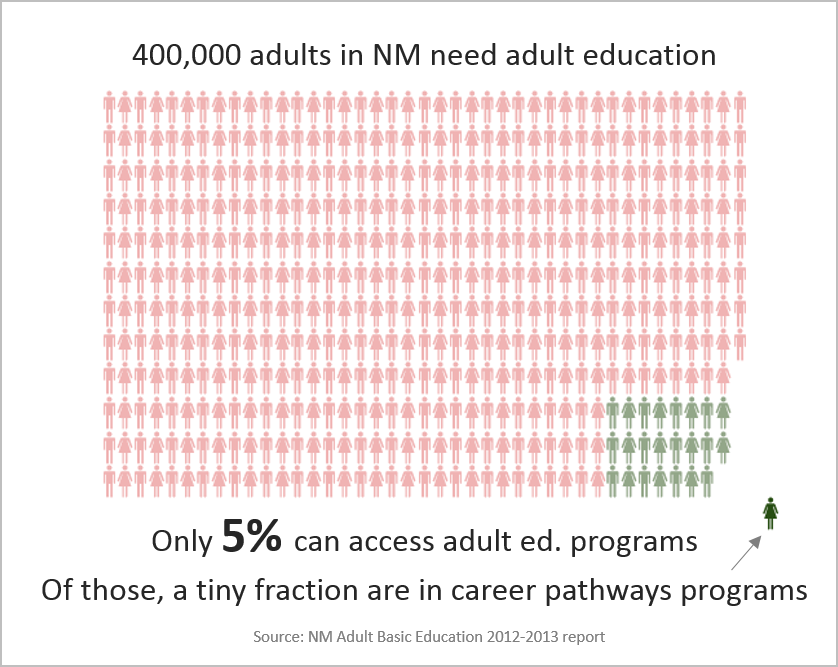by Armelle Casau, PhD
September 25, 2014
My 6-year-old daughter recently asked me a very astute question: how it was possible that people who are working can still be poor? That’s a good question! The answer can be complicated. For example, since it’s not adjusted for inflation, the minimum wage has lost about 10 percent of its purchasing power since it was last raised in 2009. Also, having an education pays off now more than ever in this 21st century economy. Adults with college degrees or industry-recognized certificates usually earn family-sustaining wages, which means they make greater contributions to our economy.
Unfortunately in New Mexico, almost 70 percent of all working-age adults (ages 18-64) do not have a college degree or industry certificate. These 890,000 adults have few options when it comes to finding decent-paying jobs that can meet their families’ basic needs. It’s not surprising then that almost 43 percent of New Mexico’s working families are low-income. The state ranks 49th in that indicator – only Mississippi fares worst. These families are working hard but they can’t make ends meet with their low-wage jobs.
What’s bad for working families is bad for their children and the state’s economy. Almost half of New Mexico children live in working families that are low income. Our state ranks 49th in that indicator as well. And when children grow up in poverty or low-income households, they are much less likely to succeed in school, graduate from high school, and become contributing members of society.
With its poorly educated and trained workforce, New Mexico has a hard time attracting new businesses and high-wage jobs to the state. This stymies our economy and continues the cycle of New Mexicans stuck in low-wage jobs. The quality of our workforce can be changed, though, by investing in career pathways programs that have helped large numbers of low-skilled and low-income adults in other states gain industry-recognized certificates and degrees in high-growth sectors.
Career pathways programs help non-traditional adult students effectively transition into college and earn high-demand credentials. Career pathways work by weaving together and aligning adult basic education programs (focused on improving literacy, math, and English proficiency skills), workforce training programs (focused on building occupational skills), and college courses (with accompanying case management and mentoring), while offering comprehensive student support services (including need-based financial aid, child care assistance, and transportation vouchers) to promote college access and success.
New Mexico has a very small career pathways program called I-BEST (Integrated Basic Education and Skills Training), which has been successfully implemented and scaled up in twenty states across the nation and is showing very promising completion and certificate attainment rates here in New Mexico. New Mexico has an estimated 400,000 adults who need to improve their basic skills, earn high school equivalency certificates, and gain workforce skills and credentials. Our current adult education programs, however, only serve a tiny portion – less than 20,000. And of those, only a small number – a few hundred – can enroll in I-BEST.
We know what works and how beneficial a career pathways program can be for adults looking to improve their employability and economic security. To help our struggling economy, New Mexico must ramp up the I-BEST program, fully integrate it into our adult education system, and provide much-needed student support services. We also need to make sure that stronger partnerships are forged between adult education providers, community colleges, workforce development boards, state agencies, and employers to maximize student outcomes and positive returns on investments.
Investing in career pathways programs like I-BEST is a win-win for New Mexico: reliance on social services would be reduced; we would be more likely to lure businesses here that need a well-educated workforce; the state’s economy would grow; and the economic security of these families improve, which would, in turn improve the academic and well-being outcomes of their children.
The federal government, adult education state agencies and community colleges, workforce stakeholders and employers, and family security advocates from across the nation are all on board for career pathways. It’s time for the state of New Mexico to get on board too.
Read more about this issue in our report, Strengthening New Mexico’s Workforce and Economy by Developing Career Pathways.
Armelle Casau is a Research and Policy Analyst with NM Voices for Children


